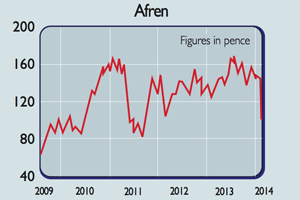Gamble of the week: A beaten-up oil play
The shares in this oil company have taken a hammering. But there is cause to be optimistic, says Phil Oakley.
Get the latest financial news, insights and expert analysis from our award-winning MoneyWeek team, to help you understand what really matters when it comes to your finances.
You are now subscribed
Your newsletter sign-up was successful
Want to add more newsletters?

Twice daily
MoneyWeek
Get the latest financial news, insights and expert analysis from our award-winning MoneyWeek team, to help you understand what really matters when it comes to your finances.

Four times a week
Look After My Bills
Sign up to our free money-saving newsletter, filled with the latest news and expert advice to help you find the best tips and deals for managing your bills. Start saving today!
If you own shares in a company, it goes without saying that you don't want to hear bad news. Shareholders in this oil company have had bucket loads of it recently. At the end of July, the company suspended its chief executive and chief operating officer it is investigating whether or not they have been paid money from an unauthorised source.
The situation deteriorated further last week, when the ongoing fighting in Kurdistan forced it to suspend operations at its key project in the country. It wasn't producing much oil, but was expected to make a big contribution in the years ahead.
To rub salt into the wound, credit-rating agency Standard & Poor's posted a negative outlook on the firm. It said the unauthorised-payments investigation might make banks reluctant to lend to Afren (LSE: AFR), which might hamper its ability to develop its big Nigerian oil projects.
MoneyWeek
Subscribe to MoneyWeek today and get your first six magazine issues absolutely FREE

Sign up to Money Morning
Don't miss the latest investment and personal finances news, market analysis, plus money-saving tips with our free twice-daily newsletter
Don't miss the latest investment and personal finances news, market analysis, plus money-saving tips with our free twice-daily newsletter
All this doom and gloom has wreaked havoc with the share price, which is down 40% this year. However, a quick glance at its share-price chart will tell you that investing in this company has been a roller-coaster ride for some time.
That's largely because investors are quite reasonably very wary of oil companies that make most of their money from Nigeria. It's become a very hostile place to do business.
Oil majors such as Royal Dutch Shell and Italy'sENI have been plagued by the theft of their oil and damage to their assets.The Nigerian government also seems intent on taking more money fromoil companies, meaning less moneyfor investors.

Projects in Nigeria andKurdistan, and exploration projects inKenya, Tanzania and the Seychelles,were set to boost oil production bymore than 10% a year for the next fiveyears.
Once the big investment spendingphase to develop the fields had peaked,investors could look forward to seeinglots of free cash flow pour in. Andanalysts are still predicting a big profitgrowth. According to Bloomberg, theyexpect trading profits to fall to $502mthis year, rising to $851m in 2016.
These forecasts should always be takenwith a big pinch of salt but what isundeniable is that Afren shares look verycheap. They trade at a 12% discountto their net asset value and offer anearnings yieldof nearly18%, based on this year's forecasttrading profits.
Some might argue thatthe risks here mean the shares shouldbe cheap. It's a fair point but the sharesmight bounce if Afren's problems abate.
Verdict: a risky buy
Get the latest financial news, insights and expert analysis from our award-winning MoneyWeek team, to help you understand what really matters when it comes to your finances.
Phil spent 13 years as an investment analyst for both stockbroking and fund management companies.
-
 Should you buy an active ETF?
Should you buy an active ETF?ETFs are often mischaracterised as passive products, but they can be a convenient way to add active management to your portfolio
-
 Power up your pension before 5 April – easy ways to save before the tax year end
Power up your pension before 5 April – easy ways to save before the tax year endWith the end of the tax year looming, pension savers currently have a window to review and maximise what’s going into their retirement funds – we look at how